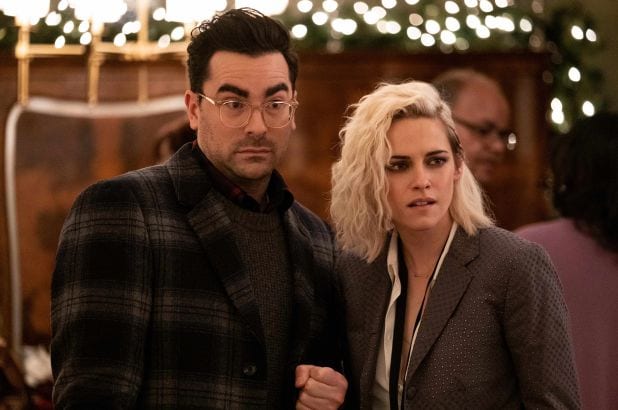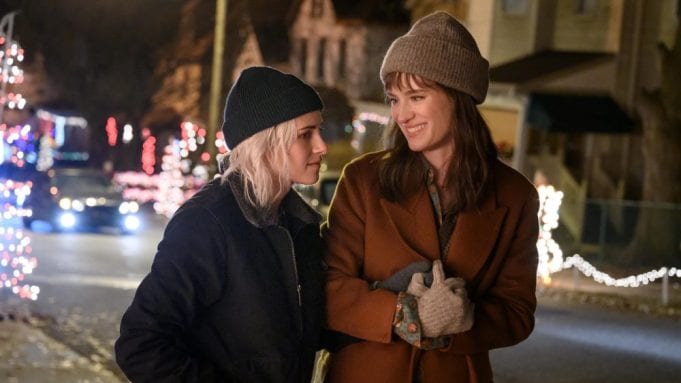Leave it to a character played by newly minted Schitt’s Creek Emmy winner Daniel Levy to speak the blunt honest truth only to get summarily dismissed. Very early on in the Hulu Original Film Happiest Season, his trusted bestie character John is trying to talk some sense into Abby, our lead played by Kristen Stewart, every chance he can get. The platinum-dyed beauty is ready to ask a father’s permission and propose marriage to her steady girlfriend Harper (co-lead Mackenzie Davis), a plan John finds borderline appalling. In a very squinted Levy-esque way, the mini-tirades ring more the seasonal jingle bells around him.

Dropping intellectual zingers centered on heteronormativity, patriarchy, ownership, and the archaic institution of marriage as a whole, John brings up extremely good points as to why folks, regardless of their orientation, should not get married anymore. His heady lines aim for laughs and get them, while hitting plenty squarely in the frontal lobe. Still, it’s the crux of Abby’s answers that defeat all the dated trappings John brings up. She has, plain and simple, found someone she can’t see herself living without. Traditions be damned, Abby wants to declare that for her lover and herself more than anyone else. She’s ready.
The opening scenes epitomize the tug-of-war in Happiest Season between head and heart. Even as a fictional holiday yarn, the setting of Clea DuVall’s comedy is rooted in a present social landscape where even the legalization of same-sex marriage five years ago has not reduced or healed all of the emotional risks and scars associated with being out on the matters of love. Poking fun at the hijinks of going back to a conservative home for Christmas is one thing. Layering the very tangible anxiety of LGBT societal fears within those laughs is quite another. Happiest Season earns worthy pride for its willingness and openness to hug out that daunting task.

Ready as Abby may be to drop to a knee and pull out that gorgeous diamond ring in her possession in front of Harper’s family for Christmas, Harper is not. While she’s eager to bring Abby home, Harper has not told any of her family they’re a couple. Even worse, they don’t even know she’s a lesbian. Harper insists on a cover story that they’re roommates and swears this is the year she will tell the truth. Waiting for introductions are Harper’s mayoral candidate father Ted (Victor Garber), well-to-do mother Tipper (Mary Steenburgen), competitive entrepreneurial sister Sloane (Alison Brie), and, last but not least, the token family weirdo and little sister Jane (the film’s co-writer Mary Holland). Also just around the homely street corner from Harper are a pair of exes (Jake McDorman and Aubrey Plaza) with very different histories, flaws, and understandings.
Initially, it is fun for the two to carry on a secret concealing their authentic selves, but that grows problematic for Abby’s ultimate plans and Harper’s upright family image to maintain wooing local campaign supporters for her father. Much of Happiest Season is the two turtle doves avoiding Christmas pitfalls and getting caught being together. The merry chase becomes who’s really hiding, who finds out first, who finds out last, and what other secrets are out there because we all can tell an outrageous scene is coming.
Calling back to the initial lies in the first place of not coming out to her family or even admitting being in a relationship, Harper isn’t doing so hot and Abby doesn’t like it. You turn into a different person when you lie. There is a not-so-pretty willingness to betray trust when one lies. Harper, like any worried person pushed to lying, changes temperaments and personality around different people for appearances. Harper’s lies add up and push the dramatic end of the film.
When the lies become about trying to be some cultivated form of perceived perfection, as they are for Harper, those lies become ones against yourself as well the people close to you. Looking out for #1 still can damage #1. If you cannot tell people you love the truth, you’re the problem, not only the lie. Likewise, if the truth you tell causes them to disown you, then they aren’t worth your love. Don’t lie to the people that matter most.

Happiest Season is the sophomore directorial effort from actress Clea DuVall, and she went all out, no pun intended, for positive representation. Led by Stewart, the cast is willing and committed to both the honesty and humor that come with the dicey emotions underneath the smiles. It’s always nice to see Kristen Stewart and Aubrey Plaza lighten up, at least as much as they can. Holland writes herself the best scene-stealing quips and gags.
The star with, no question, the most difficult arc remains Mackenzie Davis as Harper. The actress once said in a 2014 Interview Magazine piece very early in her career, “I’ve been lucky to work consistently on women who I think are interesting, fleshed out, and strong and active participants in their destiny.” That’s the opposite of Harper, written by DuVall and Holland with those missing flaws in mind. This made for a solid challenge for the Terminator: Dark Fate and Blade Runner 2049 actress. That said, the results are a bit all over the place.
To examine further, Davis also said in another interview for NPR a year later in 2015, “As a viewer, I’m personally less interested in the damaged, white, middle-class male figuring out his dreams and more interested in maybe an underdog figuring out how they’re going to survive in a world that doesn’t necessarily invite them in.” Even while courageously promoting a progressive lifestyle in the underdog position, plenty of this film’s setting is a safe and convenient one of lily-white privilege. Everyone is invited and the stakes are not very high whatsoever. Happiest Season, with its up and down inanity to veer a little Griswold-silly, slips more than stands at times, and some of that comes from its safety net.



